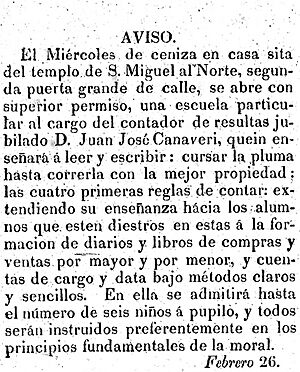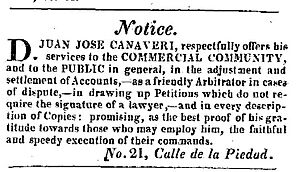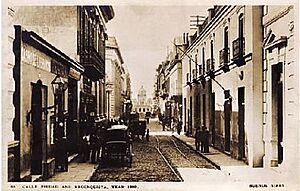José Canaveris facts for kids
Quick facts for kids
Juan José Canaveris
|
|
|---|---|
| Personal details | |
| Born |
Juan José Ramón de Canaveris Jugluns
January 19, 1780 Buenos Aires |
| Died | October 18, 1837 Buenos Aires |
| Resting place | Cementerio del Norte |
| Political party | Federal (Lomo Negro) |
| Spouse | María Agustina Denis (1785–1823) |
| Children | María Manuela Canaveris Juan Manuel Canaveris María Justa Canaveris Manuel José Canaveris José María Canaveris Patricia Canaveris Feliciano Canaveris Gerónimo Canaveris Donata Canaveris |
| Relatives | Ángel Canaveris (grandson) Sinforoso Canaveris (nephew) Juan Miguel de Esparza (grandfather) Juan José Rocha y Esparza (cousin) Juan Manuel Bayá (nephew) |
| Occupation | army teacher lawyer government merchant |
| Profession | jurist |
| Signature | |
| Military service | |
| Allegiance | |
| Branch/service | |
| Years of service | 1806-1828 |
| Rank | Captain |
| Unit | Cuerpo de Quinteros y Labradores Regimiento de Patricios |
| Commands | Creole militias of Buenos Aires Inspección y Comandancia General de Armas |
| Battles/wars | British invasions of the Río de la Plata Argentine Civil Wars |
Juan José Canaveris (1780–1837) was an important Argentine figure. He was a lawyer, a military man, and a politician. He worked as a notary (someone who makes legal documents official), a prosecutor (a lawyer who brings cases against people), and an accountant in Buenos Aires.
In 1809, he was honored for his brave actions during the British invasions of the Río de la Plata. These were times when the British tried to take over the area. After Argentina became independent, he continued to serve in important government roles. He was part of the Federal Party, but he belonged to a group that disagreed with Juan Manuel de Rosas, a powerful leader at the time.
Contents
Early Life and Military Service
Juan José Canaveris was born in Buenos Aires in 1780. His family was well-known. He likely studied at the Royal College of San Carlos and later earned a law degree from the National University of Córdoba. He started working for the government in the early 1800s. In 1810, he became a notary at the Tribunal Mayor de Cuentas. This was a special court that checked how government money was being spent.
He played a brave part in defending Buenos Aires during the British invasions of the Río de la Plata. He served as an assistant in the Cuerpo de Quinteros y Labradores. This was a cavalry unit made up mostly of farmers, ranchers, and gauchos from the Buenos Aires Province.
Because of his heroic actions, the Supreme Junta of Seville (a ruling council in Spain) promoted him to the rank of Captain in the militias. This was a big honor given in the name of the Spanish King, Ferdinand VII of Spain.
Legal and Educational Work
Juan José Canaveris was also a busy lawyer. He worked for both wealthy people and poor farmers in the countryside. He started his law career before Argentina became independent. He handled many legal cases, including helping a military officer who had been attacked.
Between 1826 and 1833, he worked as a "procurador del número" in Buenos Aires. This means he was a legal assistant who helped people with court matters. His services were listed in city guides and calendars of the time.
He also helped shape early education in Argentina. He was a pioneer in using the Lancasterian method. This was a teaching method where older, more advanced students helped teach younger ones. He had a school near the Church of San Miguel de Arcangel in Buenos Aires.
Political Career
Like his family, Juan José Canaveris supported the May Revolution in 1810, which led to Argentina's independence. He also supported the Argentine War of Independence. From 1815 to 1819, he worked in several government departments. These included the Junta de Observación (a council that watched over the government), the Comisaría de Guerra (War Department), and the Ministerio de Hacienda (Finance Department) of Buenos Aires.
In 1820, he served in the Honorable Junta de Representantes, which was a group of representatives. The next year, in 1821, he became an accountant for the Tribunal de Cuentas of Buenos Aires.
Political Conflicts and Later Years
Juan José Canaveris and his family were involved in the political fights between the Federalists and the Unitarians during the Argentine Civil War. He was with Governor Juan José Viamonte when Viamonte's house was attacked by a group called the Sociedad Popular Restauradora. This event shows how intense the political disagreements were.
In 1830, Canaveris worked in the Inspección and Comandancia General de Armas. This role involved overseeing weapons and military matters. He helped sign up volunteers to join the Regiment of Patricians, an important military unit.
He also played a part in the early days of Argentina's economic institutions. He attended meetings of the National Bank with other important figures, including journalists and businessmen.
In 1833, he was chosen to be part of a jury that protected the freedom of the press in Argentina. He belonged to a moderate group within the Federal Party, sometimes called "lomos negros." He faced political difficulties during the time of Juan Manuel de Rosas, being wrongly accused of being a Unitarian in 1835.
After leaving political life, Juan José Canaveris went back to being a lawyer and accountant. In 1835, he advertised his services in a newspaper called The British Packet, and Argentine News. He offered his help to the American and British communities in Buenos Aires.
Family Life
Juan José Canaveris was married to Agustina Denis. Her family was a respected Creole family with roots in Ireland and Portugal.
He lived his whole life in his father's house in Buenos Aires. The house was on Calle de la Piedad, in the San Nicolás neighborhood. Many English and Irish people lived nearby. He was listed in the 1827 census of Buenos Aires.
His family members, including his siblings, cousins, and nephews, sometimes had different political views. His son, Juan Manuel Canaveris, was a soldier who later had to go into exile in Montevideo because of political issues.
Another son, Feliciano Canaveris, who was also a soldier, was killed in 1843. His death was linked to General Manuel Oribe.
His daughter, Patricia Canaveris Denis, received a government pension. This was a payment for the services her father had given to the country.
Juan José Canaveris was in charge of the funeral arrangements for his mother, Catalina Bernarda Esparza de Canaveris, who passed away in 1832. Her remains were moved from San Isidro to Buenos Aires and buried in the Santo Domingo Convent.
His family's background is interesting. While his last name might suggest French or Italian origins, their way of life was not like the French or Italian communities of that time in Buenos Aires. It's possible his ancestors were from noble or wealthy families. They often lived in areas of Buenos Aires where English, Scottish, and Irish communities had settled.
 | James Van Der Zee |
 | Alma Thomas |
 | Ellis Wilson |
 | Margaret Taylor-Burroughs |




